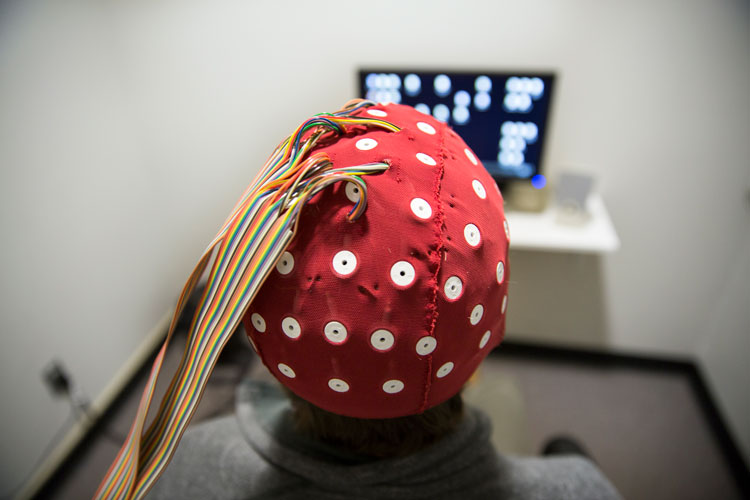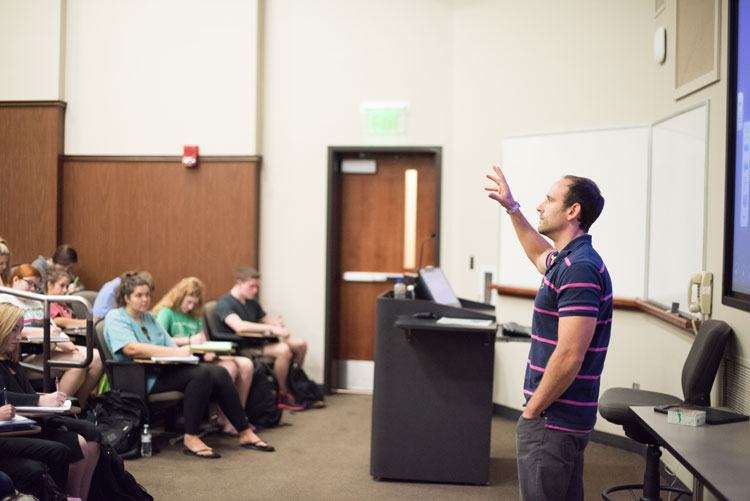The cognitive psychology program began in 1966 as a graduate training program in intellectual disability research, with funding from the National Institute of Child Health and Human Development. Over the years, the emphasis on cognitive aspects of intellectual disability grew, and in 1990 the program began to offer a full array of coursework and research in basic cognitive psychology.
This included study in the basic areas of cognition (e.g., attention, memory, spatial cognition, decision-making, language), with the unique opportunity to focus on individual differences such as aging, ethnoracial category, and working memory span levels as well as intersections with health and brain diseases like Alzheimer’s disease.
During the program, students work closely with a specific faculty member who serves as the student’s research mentor. The program offers coursework covering a broad background in psychology, in-depth study of research methodology and statistics, and advanced coursework in Cognitive Psychology. Students attend a weekly brown-bag research seminar, are provided with a guided introduction to college-level teaching.




“The graduate programs in the Psychology department at the University of Alabama are among the best in the nation. As a graduate student I have had the opportunity to design a unique and impactful research project with the help and support of very knowledgeable faculty. I was given the guidance and freedom to be creative and expand the boundaries on what behavioral science can achieve. My research has been featured on national news circuits, won regional awards, been presented in a Tedx Talk and has earned me the top Masters research honors in the Psychology department and the College of Arts & Sciences. This department has really made me realize that there are no limits to what I can achieve through research.
— Barbara-Shae Jackson, Recent graduate from the Cognitive Psychology PhD program


The Cognitive program is highly focused on research. The program uses a mentor model for research training in which students work with a specific faculty member whose research focus matches the students’ interests, although cross-lab collaboration is also encouraged. Students typically complete the program in 5 years.
| Year 1 | Year 2 | Year 3 | Year 4 |
|---|---|---|---|
| Coursework in research methods, statistics, psychology seminars | Complete master’s thesis | Begin dissertation research | Dissertation research |
| First-year project | Continued coursework | Teaching of Psychology course | Teaching as a primary instructor |
| Master’s thesis research |
Students in our program receive full funding for four academic years (this may be fewer for students entering with a master’s degree). Funding includes a monthly stipend for nine months, health insurance, and a full-tuition waiver. Stipends vary based on the type of financial support each student receives. Types of financial support include graduate assistantships (Research Assistant, Teaching Assistant), fellowships, or scholarships. Historically, funding has been available to support students in their fifth year, as well as during summers.
Funding is also provided by the department and the graduate school to travel to conferences each year and to conduct research.
Each year, the Graduate School also awards some fellowships to incoming students, which supplements the standard stipend. These include the Graduate Council Fellowship (GCF), McNair Graduate Fellowship, and the National Alumni Association License Tag Fellowship. Students do not apply for these fellowships, but rather are nominated or chosen by faculty after the student has been admitted into the program.